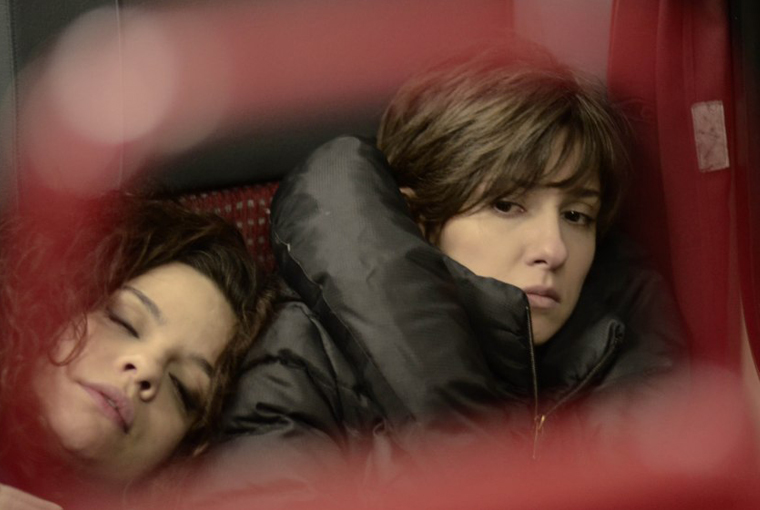
On the 26th of May, over 80% of voters in Romania rejected a series of reforms by the ruling coalition that would make it (even) more difficult to combat state corruption, the latest event in a wave of defiance and protest that has shaken the country over the last two years. Hoping that the country’s membership in the EU will help bring about some change, the Romanian people are now looking towards the West for both political and cultural stimulation. Since the early 2000s, Romanians have also been reshaping their cinema, a development widely perceived as a national New Wave. But some Romanians already find that the New Wave aesthetic is worn out. The recurring theme of social and economic transition after Communism no longer seems relevant to a lot of young people. Many of those starting to enter the workforce today were born well after 1989. Almost fifteen years after the release of The Death of Mr. Lăzărescu, to many the style it exemplifies seems too preoccupied with the past rather than the future.
Perhaps it is sentiments such as these that explain the standing ovations at the Romanian premieres of both Corneliu Porumboiu’s thoroughly decent The Whistlers, and Tudor Giurgiu’s unremittingly dull Parking. Both Romanian productions are mostly set in other countries, while Romania features in them only as the butt of occasional jokes. But while this internationalist view of cinema can be a positive thing, it is important not to forget the past. And it would be a pity to overlook any upcoming filmmaker just because of prejudice against certain characteristics reminiscent of a cinematic movement. The establishment and continued success of the Transilvania International Film Festival in Cluj is very much connected to this very movement, and Romanian cinema’s appeal to international markets is still linked to the films of the New Wave.
Mo came as a bolt from the blue to premiere at the Romanian Days section of the Transilvania International Film Festival. A classic yet fresh take on coercion in a story about two girls and their male professor, Radu Dragomir’s first feature is a tight, fast-paced film with all the complex storytelling, realist acting and dark humor that befits a Romanian New Wave jewel. And yet it is also very much a film of our time.
Mo (Dana Rogoz) and her best friend (Mădălina Craiu) are taking the train to the city to sit their university exam; Mo’s worried mother waves them off at the station before sunrise. In the examination room, there are two invigilators: a middle-aged woman who does all the work of making the students take their exam, and the professor (Răzvan Vasilescu), who sits upright at the front of the hall at a large wooden desk slowly peeling an orange, his eyes fixated on the students in the hall. He soon spies the girl’s ploy – they have hidden their cellphones in their underwear – and orders his assistant to search them. Mo, who quickly singles herself out as the strong-headed one, fishes her cellphone out, and tosses it defiantly onto his desk, saying, when asked about her intention to cheat, “I had no pockets”.
The next day, they are given another opportunity to take the exam. Indeed, cheating in examinations, as shown in Diana Gavra’s excellent documentary The House with a Lock about corruption in Romania, which also premiered at TIFF, is the norm rather than being an exception. The girls then go to visit a male friend’s dormitory to try and get his notes, but eventually realize that his notes contain another, hidden way of cheating. Though he’s one of the best in the class, as he says, “you girls are cheating, why shouldn’t I try and cheat too”.
But lest we forget the device that will drive the story, we should note that Mo’s cellphone is still with the professor, which eventually leads them to his big downtown apartment. This rendezvous, which quickly turns into an invitation to dinner, doesn’t come across as all that sleazy right away. Carefully written, the script draws the audience in, taking us along with the girls into the apartment of this ageing man when he tries to understand what they’ve been doing rather than studying for the exam. What seems to worry him is not that they don’t care about his subject, but rather that they don’t care about anything: from what we can tell, a serious fatherly concern. Being a teacher myself, I could relate to his frustration – fear of failure to convey a love of learning.
Inside his apartment, we are witness to two points of view. The professor is annoyed by his student’s lack of basic culture. He is trying to let them prove themselves, and at the beginning it doesn’t feel necessarily nasty, but more like genuine frustration growing out of generational differences. He asks them, “If you don’t like school – what do you like?” The girls, on the other hand, are impressed but simultaneously puzzled by his specific, somewhat fussy questions – why should they have to talk about something in detail when they can just look it up on the internet?
When they say they like films and music, he tries to pressure them on that. While preparing dinner, he tells them to choose any DVD in his vast collection – which takes up a large wall in the apartment. They take a long time choosing, and after one failed attempt to answer questions about The Musicbox by “Stan şi Bran” (Laurel and Hardy in English), he is satisfied with their responses about a simpler film – Titanic. When he asks them about music, they have trouble responding to his questions too, though Mo inadvertently reveals the extent of her insecurity by leaving the room in anger when he corrects her about a song by a band she loves.
During these “games” they play, there is an astute allusion to Mungiu’s 4 Months, 3 Weeks, 2 Days, when the professor offers it up as an object for them to be quizzed on. But they don’t really know the film. “4,3,2, that’s Romanian, right?”, they ask. “It’s a pity”, shrugs the professor, “it won the Palme d’Or”. Here, we catch on that class and academia are going to play a key role in the downfall of these girls, whose wide-eyed appreciation of their teacher’s glamorous life is gradually revealed behind a facade of pouty nonchalance. If only they knew more about the women who came before them – both in real life and in the story 4 Months, 3 Weeks, 2 Days tells. Knowledge of the plot of that film could have led them in a totally different direction.
The strongest moments of the film are the simplest arguments. When Mo wants to leave, she drains her wine glass and for her this is a subtle form of rebellion – drinking all the wine in the glass. However, the professor fills her glass again despite her protests, “If you’ve finished you leave some wine in your glass on the table, if you finish your wine it means you want more.” Though it comes across as breezy, there is evidence that countless hours of work have gone into the script (also written by Dragomir) to show sexual manipulation unfold gradually.
These language games are games of hierarchy and Dragomir doesn’t shy away from showing the physicality of that hierarchy. The film is almost theatrical in its use of levels and heights, and the girls and the professor always find themselves navigating different levels. During the exam he is far away from them; when they sit down in a bar, he stands right up; in the apartment they crawl on all fours to find a DVD they can be quizzed about. Mo sits at the professor’s feet while he plays the guitar. This physicality is not overblown, but it adds a weird tension to the film. Another thing the director and his DP Liviu Marghidan play with is perspective; near the resolution of the film, when Mo and the professor are engaged in a musical interlude in the foreground, the wary best friend stands gloomily in the kitchen, behind a large counter. She warns Mo not to get carried away before he enters the room. Her uncomfortable silence during the scene that ensues is a powerful metaphor for all the naysayers of the #MeToo movement. Hers is a silence of befuddlement but also of powerlessness.
After its screening in the Romanian Days section, Mo was the film which probably generated the most debates among festivalgoers. The denouement of the film is nastily ironic. By taking his “revenge” on unmotivated students who have not concentrated enough on their schoolwork, he creates another reason for them to be unmotivated and distracted, calling into question their very personhood. Another distraction which cannot be explained away by quizzable knowledge.




Leave a Comment